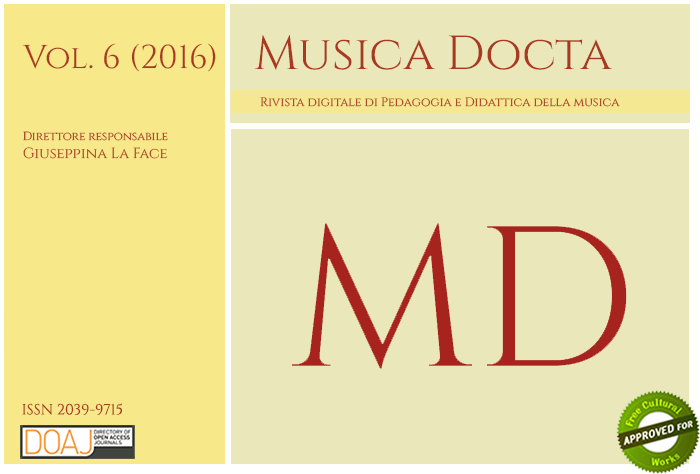Listening to the Dead: Toward 21st-century Music Histories
DOI:
https://doi.org/10.6092/issn.2039-9715/6566Keywords:
History, Diaspora, Empire, ConsumptionAbstract
This paper assumes as a premise that music histories, like all histories, result from a conscious choosing of one’s cultural ancestors. By asking who ‘the ancestors’ would logically be for musicians active in the contemporary United States, it implies the connections between institutional music histories and the ideological formation of local or national identities, and acknowledges the increasing difficulty of managing those connections in an era of widespread migration and the oft-proclaimed decline of nation-states in favor of globalizing entities. Determinedly recommending neither universal or global adjustments to music historical pedagogy, it asserts profound structural changes in music history curricula as inevitable, names the network of economic and ideological interests against which curricular reformers struggle, and reaffirms the relevance of music history as a way to learn from the dead how it could be to be human.Downloads
Published
2016-12-30
How to Cite
Cusick, S. G. (2016). Listening to the Dead: Toward 21st-century Music Histories. Musica Docta, 6(1), 51–56. https://doi.org/10.6092/issn.2039-9715/6566
Issue
Section
Articles
License
Copyright (c) 2016 Suzanne G. Cusick
The copyrights of all the texts on this journal belong to the respective authors without restrictions.
This journal is licensed under a Creative Commons Attribution Share-Alike 4.0 International License (full legal code).
See also our Open Access Policy.
Metadata
All the metadata of the published material is released in the public domain and may be used by anyone free of charge. This includes references.
Metadata — including references — may be re-used in any medium without prior permission for both not-for-profit and for-profit purposes. We kindly ask users to provide a link to the original metadata record.






